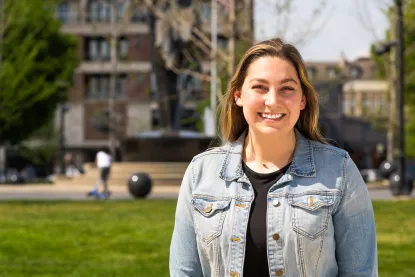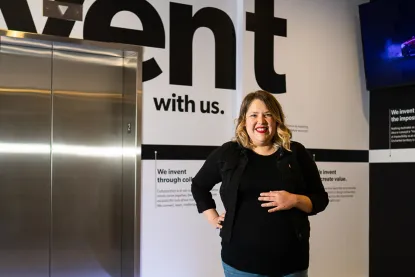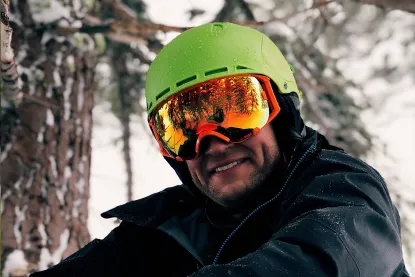
Did you confirm that you’re not a robot today? Click a button, and dinner, or a snowboard, appeared at your home? Text with chatbots about your airline tickets or hotel room? Video visit with your doctor or daughter? Ask the internet to tell you anything in the world, and it instantly did?
If we put our phones down for a second and thought about it, it would seem like magic. But a number of NMU alumni are behind the screen, creating and designing the apps and digital experiences that power our modern lives.

Ellen Holmes '14
PubNub Account Manager

Lindsey (Archambeau) Rosenburg '09
Vectorform, Associate Experience Director

Adam Harkness '07
Burton Snowboards, Global Search Manager
Ellen Holmes | ’14 BS, Marketing
PubNub Account Manager
What do you and your company do?
PubNub helps companies with an online presence provide in-app chat, send alerts and notifications, control IoT [Internet of Things] devices, and share location details all in real-time. These features have become more important as COVID has forced our everyday interactions to take place virtually. Some of our clients include established and new ventures, such as Adobe, Draftkings, Kustomer, Life360, McDonald’s and Noon Academy.
From talking with a customer service agent or chatbot, to seeing how many minutes out the bus is to your stop, PubNub’s chat APIs [software that allows applications to interact] help make everyday tasks easier. Companies like Peloton, Match.com and Swiggy rely on us to connect users across the globe in ¼ of a second or less.
Pocket Gems is a gaming company that uses PubNub for in-game chat, which allows players to communicate without leaving the game. It increases their time in the game, while gaining information from conversations taking place. This information is helpful in shaping the roadmap for their new games and features.
Most important to me is our impact in the healthcare field. Zoll and athenahealth are two companies where PubNub’s products improve the patient experience through HIPAA-compliant chat, notifications, scheduling and information sharing. This has the ability to cut out wait time in a situation where every second counts. Think of a medical team tracking an incoming ambulance while being able to review the patient’s medical records and updates as the EMS team provides updates while in route.
PubNub has been around for over 10 years and our system processes 1.9 trillion messages each month—which is a crazy number to think about. This is thanks to our team of over 100 around the globe, which is almost double in size compared to a few years ago. We just received the 2020 Best Communications API award from API World—something we’re really excited to have earned!
How are you innovating this space?
Our goal is to help our customer’s engineering and design teams focus on what they do best, while we’ve done the tedious work of creating a reliable, scalable messaging system and keeping it updated. That way while we focus on improving users’ communication experience through things like typing indicators and message reactions, they can focus on the things their customers care about most.
These systems are really hard to build out, and are difficult to scale while ensuring safety and reliability. Someone’s code might work if a hundred people are using it to start, but not always when thousands or millions of people are interacting at the same time. Our engineers have gone through all the hurdles to create components that are almost drag and drop but leave room for customization for a seamless fit. Now with a few lines of code, companies can implement chat and other communication features in less than a week!
How did NMU help you get here?
NMU allows you to go beyond your comfort zone so often, that’s what becomes normal to you—and you feel held back if that’s not what you’re doing. A class that first comes to mind for me is Gary Brunswick’s capstone marketing class, since it was an ass kicker. We were given real-life case studies of situations that one might face in the workplace, like how to launch a new line of dog food that needs to be refrigerated. After our presentations, we would then learn what was attempted and what succeeded. It was almost like we had an internship at all of these different companies. You had to learn how to be dynamic and learn that there’s not only one right way but there can definitely be many wrong ways.
Lindsey (Archambeau) Rosenburg | '09 BA, Graphic Communication and French
Vectorform, Associate Experience Director
What do you and your company do?
Vectorform is a digital agency that invents products and experiences for customers. We work with clients who are looking for innovative solutions that solve their most complex problems.
We work with companies everywhere from energy providers to automotive to consumer products. As the experience director, I oversee the team who contributes to designing what an app or web experience looks like, what it does, and what it feels like. Everything from UI design—what color are the buttons and where are they placed? To UX design—when I click on this, where does it go? And details like copywriting and animation integration.
One of the top projects I’ve worked on recently was with a startup out of Ohio called Deep Lens. We helped them create a platform where pathologists can upload pathology slides and then use AI to help match cancer patients with appropriate clinical trials. It takes some of the manual research out of their workflow and makes more effective matches, which leads to better cancer care. It was a really good blend of impactful, meaningful work, and fun problem-solving to help them build a platform from the ground up.
Every project has a unique set of problems to solve. While some may seem exciting or sexier than others, the thing I take pride in is connecting to the end user and predicting what kinds of problems they may have and how our solution solves those.
How are you innovating in this space?
Innovation doesn’t just mean technology for technology’s sake. If it doesn’t solve an actual problem it’s not going to be impactful. Sometimes it’s just looking at problems or processes differently and coming up with new approaches. It’s a challenge but it’s also a really big opportunity when you’re working with emerging tech, because you don’t have to stick with familiar interaction patterns. Get to the root of what the need is and invent that app, interaction or solution.
It’s really important that the voice of the customer is woven into the process from beginning to end, and even after the product is launched. Especially categories of folks who may have unique needs or disabilities. Build in mechanics for continual feedback so things can evolve and you can keep enhancing and growing the experience.
Innovation is a mindset. It’s about approaching a problem differently. It can happen with anything, really. Where are you at and what kind of problem are you trying to solve?
One of the things I’m most excited about right now is that we’ve got these really cool areas of technology and these really powerful machines that live in our pockets, and I see more of that all seamlessly converging.
Mixed reality and augmented reality are merging with things like voice and IoT, getting to the point where you are living in that Back to the Future future, where everything is connected, and you can talk to your toaster and start your car from the bathroom. Ultimately, technology is a tool, and we just want to use it to get a little more of that most precious thing of time, and efficiency, out of it.
How did NMU help you get here?
My experience at NMU really grew my leadership potential because there were so many opportunities to lead. All of the activities I was involved with got my feet wet with being a leader and wanting to pursue that more. I got one-on-one custom attention, from folks like Keith Ellis, who really understood each student’s strengths and weaknesses and helped guide them to a place that set them up for success. I recognize that the “no problems, only possibilities” mindset came from my NMU experience.
Design is literally never going to go away because it is something that everyone has experience with. The most important aspect of that is understanding the human connection to a product, whether it be digital, physical, visual, etc. The design program at NMU hammered it in to your head that you need to understand your audience, you need to solve a problem in a way that makes sense, and it gives you the foundational skills you need to succeed anywhere in today’s world.
Adam Harkness | '07 BS, Media Production and New Technology
Burton Snowboards, Global Search Manager
What do you and your company do?
I manage the global search program for Burton Snowboards and am responsible for maximizing the reach and visibility of burton.com and the company’s other digital properties on search engines. I work with a team of search marketers around the world to execute tactical SEO (search engine optimization) and SEM (search engine marketing) initiatives to grow the brand and increase snowboarding participation.
Burton is a leading manufacturer of snowboards, snowboard boots and bindings, and is basically responsible for putting the sport as we know it today on the map. Until recently, Burton was primarily focused on the wholesale side of the business, providing gear to snowboard shops that would then be sold to riders. And while that approach will always be important (support your local snowboard shop!) the bottom line is that consumer preferences have shifted. The change was slow at first but accelerated tremendously during COVID: People want to buy stuff on the Internet. That is the future. Companies that reduce friction and make online shopping easier are the companies that are going to win. And a big part of reducing friction is making it simple for people to find what they want, when they search for it.
So a big part of my role at Burton is identifying trends in how people use search engines and then adjusting our strategy and technology accordingly.
How are you innovating in this space?
When it comes to organic search, one of the trends we are actively preparing ourselves for is a zero-click future with Google. The rise of rich results like featured snippets and knowledge panels provide searchers with the answers to their questions directly on the search results page and they don’t need to click-through to a website. For example, if you search “how many inches are in a foot?” the top result is a unit conversion calculator that displays “1 foot = 12 inches” and these types of rich features are becoming more ubiquitous with every algorithm update. Google is in the business of serving the best results as quickly as possible and there is a very real possibility that in the near future, all types of search (navigational, transactional, and informational) will be conducted directly on the search results page. To set us up for that possibility, we are redesigning, restructuring and rebuilding our content.
When it comes to paid search, one of the ways we are innovating is leaning into Machine Learning to optimize our bid strategies and budget allocations across hundreds of cost-per-click campaigns globally. In a truly cross-functional initiative, Burton’s search team works closely with the finance team to establish a minimum acceptable profit margin threshold for each individual product in the catalog. Next, this information gets fed into an algorithm that includes thousands of other intent signals (who is searching, what time of day it is, where they are located, what device is being used, their previous purchases, etc.) to build a model that factors in the probability of that searcher buying something—if that looks likely, then we bid more for that click than our competitors.
How did NMU help you get here?
From Radio X to Public Eye News to hanging out in the recording studio on campus or troubleshooting wifi issues in Halverson, NMU helped me discover my passion for using technology to solve problems. And this thirst to solve problems allowed me to pursue some really unique opportunities over the years, including working in television and radio, public relations, consumer protection, software and snowboarding. If I’ve learned anything in my career, it’s that to be successful at anything, you have to love the work that you do and stay flexible, hungry and passionate.
By Rebecca Tavernini '11 MA